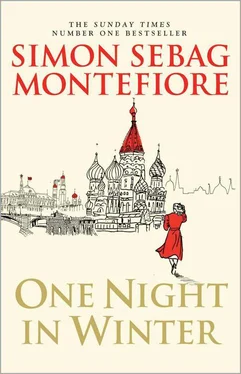‘Tea’s ready,’ Agrippina said sweetly. Benya watched her pour the chai for the teachers in order of seniority while reliving the way he had undressed her, opened her long legs and stroked her with his fingers, his tongue, his cock, just twenty minutes earlier, in his one-room apartment round the corner. They had enjoyed forty-nine minutes of dizzy pleasure and she had not even had time to wipe herself before rushing back – a thought that now thrilled him.
No one knew of course. The secret particularly delighted Benya because his fellow teachers were perfect examples of the new generation of tight-arsed Soviet prigs. Agrippina was as pretty as she was pure, a Soviet virtue she liked to promote by saying ‘I don’t believe in gossiping about people’ and ‘I believe a Soviet girl must keep herself for husband and children’, sentiments she seemed to believe absolutely when she said them.
When Benya was not reading (he was a voracious reader) or talking, he was assailed by his epicurean passion for women, poetry, food, the senses. Once he had been a well-known writer who had reported on the Spanish Civil War and known Picasso and Sartre. But he had lost the two jewels of his life. He had lost contact with the daughter of his marriage when she and her mother emigrated to the West. And he had lost the only woman he’d ever truly loved, a woman whose memory caused a jolt of agony, even now. She had been an official’s wife, a mother, an Old Bolshevik. In 1939, she had fallen into the abyss of ‘Soviet justice’ – and he had fallen with her. When, or if, she returned, he would be waiting for her. It was a promise he intended to keep.
Dr Rimm left to teach Communist history. Benya looked at his watch. He was now five minutes late for his favourite class. He finished his tea and hurried out, noticing as he did so, a badly typed envelope in one of the pigeonholes. As he passed Dr Rimm’s classroom, he peeped around the door. ‘Comrade Rimm,’ he said, ‘you have a letter.’
He entered his classroom and was at once enveloped in the affection and respect of the pupils. Their vivacious chatter delighted him: Nikolasha was showing Vlad Titorenko some pages of his obsessional project in his velvet-covered notebook. Both boys sported Byronic hairdos as a tribute to their romanticism. It was surely only a matter of time, Benya decided, before Dr Rimm brought in an army barber. The new boy, Andrei Kurbsky, had turned out to know even more Pushkin than the others. And there was Serafima – listening to him with her head on one side, beautiful without believing it, drawing the eyes of the boys without being aware of it. Even now, Nikolasha was looking back at her; Andrei too. But there was another reason Benya appreciated her: she, more than anyone else, reminded him of his lost love, the woman who’d disappeared before the war.
He could not believe his own luck at landing this job, at teaching literature to children who loved it as much as he did. It was his Second Life and he’d been reborn. He could no longer write. That reed was broken yet he could teach – and how! But he was marked with the black spot: how long could it last? He wanted to share all he knew before it was over.
‘Dear friends, beloved romantics, wistful dreamers!’ He clapped his hands and opened his Onegin . ‘It’s the night of the fateful ball’, he said, ‘that causes the duel. Just imagine the excitement. Everyone is waiting for Lensky the fiancé to arrive. How does Tatiana feel to see Eugene Onegin?’
‘And paler than the moon at dawn,
She cannot raise her eyes to face them
And trembles like a hunted fawn.
Inside her, stormy passion’s seething;
The wretched girl is scarcely breathing…’
Golden pauses, and then cries: ‘Oh, the agony of her suffering! But who can give us some idea of what she’s going through? Andrei?’
‘I’m not sure… Isn’t love just a thing in novels and songs?’
‘Who agrees with Andrei? Nikolasha?’
Nikolasha sat up. ‘The absence of love means death,’ he stated, his deep voice cracking. ‘Like Romeo and Juliet. Antony and Cleopatra.’
Golden looked interested. ‘So you are saying love reaches its apotheosis in death? Doesn’t it perish when life is extinguished?’
‘On the contrary,’ replied Nikolasha. ‘Death makes love immortal. Isn’t that the lesson of Pushkin’s duel? How to be a Russian, how to be a lover, how to live and die.’
‘But love is just amorous obsession, surely?’ blurted out George.
‘Class is what matters,’ said George’s brother, Marlen. He had one of those Bolshevik names – a combination of Marx-Lenin – that were fashionable in the 1920s, thought Benya, and now mercifully assigned to the dustbin of history. ‘The rest is just bourgeois sentimentalism, a very dangerous thing.’
‘Whom do you agree with? Serafima?’ said Golden. As he had expected, everyone turned to Serafima.
‘I’m not sure I can say…’ said Serafima.
‘Have a go, Serafima Constantinovna,’ Golden coaxed her. ‘Illuminate our darkness.’
She put her head on one side. ‘Well…’ She spoke very softly so that Nikolasha and Andrei had to lean over to hear her. ‘I would say that in Onegin Tatiana dreams of nothing else. She can’t eat or sleep. She protects the secret in her heart. No one else has suffered or celebrated love like her. Love is all that matters.’ She looked around. ‘That’s what I think.’
George Satinov and Minka pulled Andrei into the doorway as Dr Rimm waddled past and down the corridor. Both were shaking with laughter. George grabbed Andrei’s cuff: ‘Come here! Watch the Hummer.’ They followed Dr Rimm towards the common room.
‘He’s looking back. Pretend to read the notices,’ whispered Minka.
Dr Rimm had stopped outside the common room where the teachers’ post was placed in pigeonholes.
‘Now – look,’ said George as Dr Rimm picked up his mail, leafing through papers, until he suddenly held up an envelope. ‘He’s got it!’
Dr Rimm peered around, up and down the corridor, and then, stuffing all the other papers back into his pigeonhole, he hurried off with the envelope to the teacher’s lavatory. When he came out, he was singing so loudly and tunelessly that he was almost dancing. As he passed them, they struggled not to giggle.
‘What was that letter?’ demanded Andrei.
‘You can keep a secret, can’t you, Andrei?’
‘Of course.’
‘He can,’ agreed Minka. ‘Let’s tell him.’
They pulled him down the corridor and outside into the little yard by the science laboratory. No one was there.
‘Read this,’ said George, handing him a piece of paper. ‘This is the next one.’ It was typed in capitals:
TUNEFUL SINGER AROUND THE SCHOOL, SWEET ‘ONEGIN’, I KNOW YOU LOVE ME, BUT YOU ARE ALSO LOVED FROM AFAR, AS ONLY TWO BOLSHEVIKS CAN LOVE.
KISS ME LIKE A TRUE COMMUNIST.
‘TATIANA’
‘Oh my God!’ said Andrei. ‘He thinks…’
‘That’s the fun of it,’ replied Minka. ‘Don’t you love it? “As only two Bolsheviks can love”! That was my idea.’
‘Who do you think he thinks wrote it?’
‘Director Medvedeva perhaps?’ George was laughing so much that he could barely get the name out.
Andrei was amazed. This could only happen now, after the war. George’s father was a leader, his mother was a teacher; and both Minka’s parents were important. Andrei knew that only two such privileged children would dare to contemplate a trick like this, and on the First Secretary of the School’s Communist Party Committee. That stuff about ‘loving like a Bolshevik’ was perilously disrespectful. In the thirties, people had received nine grams in the back of the neck for less…
Читать дальше












